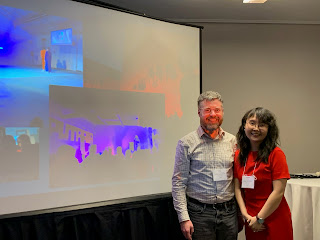Past and Present Urban Studies faculty present at this years Eastern Sociological Society conference
Between March 6-9, Urban Studies faculty, past and present, shared their research at this year's Eastern Sociological Society annual meeting in downtown Boston.
Dr. Timothy Murphy, Dr. Danielle Morales (now at UMass Boston), and Dr. Adam Saltsman were all at the conference.
Dr. Murphy presented his paper, "At Home in Bohemia: Queer Belonging among Migrants in Amsterdam and São Paulo."
Abstract
Newcomers to cities often seek belonging with other urban residents along a variety of lines of identification, whether it be shared beliefs, ethnicity, regional identity, gender, race, age, socioeconomic status, sexual orientation, political affiliation, profession, hobby etc. This paper examines how middle-class migrants in pursuit of greater freedom of self-expression and a better quality of life establish a queer sense of belonging through bohemian spaces and networks in two major cities that are rarely analyzed together: Amsterdam and São Paulo. Previous research has evidenced that both cities are destinations for people in search of greater opportunities to realize alternative lifestyles (Murphy 2019). The ethnographic research on which this paper is based focuses on migrants who participate in bohemian subcultures that center on avant-garde and non-normative approaches to living, art, aesthetics, socializing, and self-expression (Chauncey 1994; Lause 2009; Lloyd 2006; Murphy 2019; Velho 2002). Taking part in either Amsterdam or São Paulo's’ bohemian communities, which are often distinct from mainstream LGBTQAI+ spaces and events in these cities, these migrants are able to forge community with others who have a shared affinity for the non-normative and the avant-garde, including but not limited to a queer approach to gender and sexuality (Halberstam 2005; McCallum and Tuhkanen 2011). Although many participants in these bohemian communities identify as members of the LGBTQAI+ community, others do not, irrespective of their desires or personal experiences involving non-normative gender and sexuality. On the one hand, this research attempts to better understand the challenges these migrants face as newcomers/outsiders in the largest cities in the Netherlands and Brazil. On the other hand, it examines what role queer/non-normative networks and spaces play in migrants’ sense of community and belonging in such a city. This research, therefore, looks at the layering and intersection of at least two experiences of outsiderness - migrant subjectivity and queer/bohemian subjectivity - contributing to scholarship on bohemian subcultures, migration, queerness, the global middle class, and urban studies. Based on two months of preliminary ethnographic research conducted in 2024 in Amsterdam and São Paulo, this paper will consider the following questions: What motivated migrants to move to these cities in particular and what keeps them there? How does daily life in their new cities of residence compare to life before migrating? To what extent does their migrant status impact their sense of community and belonging in the city? How do bohemian communities take shape in Amsterdam and São Paulo, and how does mainstream society - Dutch and Brazilian, respectively - influence these communities? How do migrants engage with bohemian communities, and what value do they add to migrants' lives? What does queer belonging mean for migrants and how does it manifest vis à vis these bohemian communities?
 |
| Tim Murphy and Danielle Morales at ESS |
Dr. Morales, Dr. Saltsman, and grad student Huy Giang co-presented their paper: "Intersecting Inequalities: Food Insecurity, LGBTQ+ Identity, and Marginalization in Higher Education"
Abstract
Food insecurity—defined as limited or uncertain access to nutritionally adequate and safe foods—is a pressing public health issue, but it also constitutes a structural form of inequality, particularly within the context of higher education. Research has shown that food insecurity disproportionately affects marginalized student populations, exacerbating existing social inequalities tied to race, class, and gender. The growing costs of higher education, combined with the neoliberal restructuring of universities and a shifting student demographic, have intensified this problem, yet little attention has been given to how food insecurity specifically affects LGBTQ+ students.
This study seeks to bridge this gap by examining the intersection of food insecurity and LGBTQ+ identity within the broader sociological frameworks of structural inequality and marginalization. Using survey data collected in Spring 2024 from a public university in the Northeast, the study investigates how food insecurity is differentially experienced by LGBTQ+ students and the consequences this has for their health and academic performance. Initial findings show that LGBTQ+ students are significantly more likely to experience food insecurity compared to their non-LGBTQ+ peers. Beyond this, food insecurity among LGBTQ+ students is associated with adverse outcomes, including worse self-reported physical health and lower academic performance. LGBTQ+ students, already facing marginalization in terms of gender identity and sexual orientation, encounter additional vulnerabilities in accessing basic needs such as food. This is further evidenced by the finding that LGBTQ+ students are less likely to utilize campus food pantries. Whether due to stigma, discrimination, or lack of culturally responsive resources, LGBTQ+ students face barriers that make it harder to alleviate food insecurity, even when services are available.
By framing food insecurity as a manifestation of broader social inequalities, this study contributes to sociological understandings of how marginalized identities intersect with economic precarity and institutional neglect. The findings call for a critical reassessment of campus-based interventions, highlighting the need for inclusive and equity-driven approaches to address food insecurity in ways that account for the specific needs of LGBTQ+ students. Furthermore, this research adds to the literature on the neoliberalization of higher education, demonstrating how the commodification of education intensifies vulnerabilities for already marginalized groups.
 |
| From left: Huy Giang, Adam Saltsman, Danielle Morales at ESS |
Comments
Post a Comment